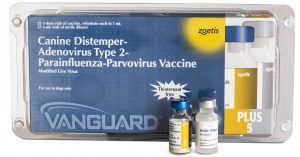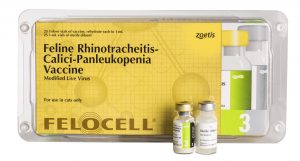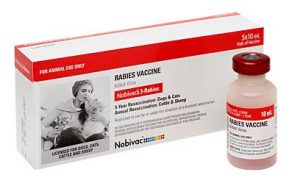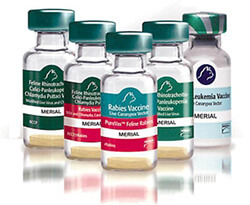Clients often ask me how frequently we give different vaccines, especially in regards to the 5 in 1 (also called DHPP or distemper /parvo ) vaccine in dogs, and rabies in cats. In light of new research, in this article I break it down for you!
Previously we gave all vaccines yearly, to make sure dogs maintained their immunity to a host of important diseases. Now we have a better understanding of immunity. We are able to better tailor vaccination to the individual animal. It is important to understand, however, that all dogs respond to vaccinations differently. After vaccination immunity steadily declines over time. This means that while some dogs are still immune years after a vaccination, others are not. Researchers calculate vaccination time tables to make sure that the vast majority of dogs will remain immune for the recommended interval.

5 in 1 (DHPP)
DHPP is a canine vaccine that prevents distemper, parvovirus, parainfluenza, and two types of adenovirus (hepatitis). Dogs should receive the DHPP vaccine at 8, 12, and 16 weeks, one year later, and then 1 to 3 years after that. Previously, dogs received DHPP yearly afterward. However new research by several vaccine manufacturers has led to the approval of vaccines good for 3 years in adult dogs that have received all puppy vaccines and a vaccination one year after their puppy set. This is due to a build up of long term memory cells. Memory cells slowly die off after vaccination so only dogs with full vaccination histories will have enough cells to last 3 years. Dogs with missed vaccinations will need to be vaccinated more often.

3 in 1 (FVRCP)
Cats should receive an FVRCP vaccine at 8,12, and 16 weeks of age, and then 6 months to 1 year later. Previously, cats received FVRCP yearly afterward. However new research shows protective immunity of over 3 years for most cats. Thus it is now appropriate to vaccinate adult cats in low risk households every 3 years. Cats in high risk households may need to be v

Rabies:
Dogs –
Dogs should receive a rabies vaccine at 16 weeks, one year later, then every 3 years. This is because it takes multiple doses for enough immunity to build up that will last 3 years. Thus, if you are late on a vaccination it may only be good for one year.

Cats –
The standard of practice is to give cats a feline specific rabies vaccine that is good for one year. Previously, veterinarians gave the same vaccine to cats and dogs, which were good for 3 years. These vaccinations, however, are associated with tumor development in cats. The feline specific vaccines do not have adjuvant, which decreases the length of immunity but does not stimulate tumor development. Your cat should always receive a feline specific vaccine.

Other Vaccinations:
Most other vaccinations, including Bordetella, Lyme, Leptospirosis, Influenza, and FeLV are either killed vaccines with a shorter duration of immunity, or are live vaccines with a lack of evidence for longer duration immunity. Thus, pets should get them yearly. This is especially important to remember for Leptospirosis, since it is often combined with DHPP. Even if you give DHPP every 3 years, your dog still needs a booster for leptospirosis yearly.
